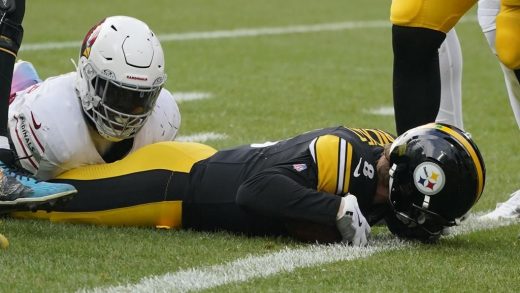
What a team. What a week.
By now, a rundown of the off-field drama surrounding Canada’s women’s soccer team is hardly necessary. It has permeated the mainstream news cycle to the point you don’t even have to follow soccer or the Olympics or sports generally in order to be fluent in the language of FIFA penalties, spy drones, rogue coaches and appeals to the Court of Arbitration for Sport.
So we won’t rehash it here. Investigations will take their course, and finally — knock on wood — we can enter a matchday with the actual soccer leading the discussion.
Silvia Izquierdo / The Associated Press Janine Beckie’s tenacity has been on full display on the pitch at the Paris Olympics.
At noon Saturday, or 7 p.m. local time in Marseille, Canada will face Germany in an Olympic quarterfinal (CBC), with the winner getting either Japan or the United States in the semis. The Canadian women have fared poorly against all three, recording a combined 10 wins from 99 games.
That’s not good. It also doesn’t matter one jot.
The fact of the matter is as much as we want to distance this country’s players from their coaching staff and governing association, we simply can’t, and neither can they.
On Sunday, in an outpouring of emotion after a come-from-behind win over France, Vanessa Gilles told a TV audience of nearly two million people — CBC’s highest-rated Olympic event to date, outside the Opening Ceremony — she and her teammates hadn’t been eating or sleeping.
Mere moments before, she had scored the game-winning goal in the 12th minute of second-half stoppage time, beating Constance Picaud with a left-footed finish to the near corner after the French goalkeeper had parried Jordyn Huitema’s heavy shot into the defender’s path.
Colour commentator Clare Rustad seemed to almost take a second before confirming to anxious Canadian viewers that “there it is,” the strike that would essentially keep a remarkably vindicating story alive. As a moment in the history of the women’s program it ascended right up there alongside Diana Matheson’s bronze medal-winning goal of 2012 and Julia Grosso’s golden spot-kick of 2021.
It was also more visceral than it was magic, felt deeply by a country and its team. What a team.
And what a week. In each of their group-stage games, Canada was cast into a different scenario. There was the uncertainty and embarrassment of the New Zealand opener; the six-point deficit that demanded the beating of host nation France; and the failed appeal ahead of the Colombia showdown, which became another must-win.
Gilles, who is having a “cometh the women” Olympics, scored the winner in that game, too, although it goes without saying that a resilient, capable and focused group was behind her, with her, in front of her every step of the way.
Team captain since Christine Sinclair’s retirement, Jessie Fleming is having as gutsy a tournament as we’re likely to see. Full-back Ashley Lawrence hasn’t put a foot wrong, and Kadeisha Buchanan has been a rock in the heart of the defence.
Huitema, for her part, is having a uniquely triumphant Games. Since coming on as a sub against New Zealand, the 23-year-old has played every minute for Canada and capped a standout showing against France by setting up that Gilles winner. Interim head coach Andy Spence clearly values her energy, athleticism and aerial ability.
Spence, it should be noted, has nailed his selections and in-game management so far.
Each of Canada’s group stage rivals required a different approach, and the 41-year-old former Everton boss made the right adjustments for each. Huitema’s introduction was proof of that, as was the Quinn-Fleming-Simi Awujo midfield against France and the use of Grosso and Janine Beckie against Colombia.
Grosso’s passing on Wednesday was exceptional, and there might not be a more tenacious footballer at this Olympics than Beckie.
In preparation for today’s quarterfinal, Spence and the entire team have no doubt been studying the United States’ 4-1 drubbing of Germany last Sunday. The Americans lined up in a 4-3-3 to face the 2016 gold medalists, and the coaching staff may well be considering the reintroduction of either Quinn or Awujo, or both.
Key match-ups will be determined by whoever Spence taps to to play opposite right-back Giulia Gwinn and left winger Klara Buhl. Lawrence will get the one they deem the most dangerous going forward.
That said, while match-ups and formations and tactics will be important, they’ll be even more important for Germany’s chances of winning. This Canada team, player for player, is better than the one that won gold in Tokyo. They know it, and they proved it three times amidst the demoralizing backdrop of the last nine days.
Now they have to prove it again. And then again. And again.
But wow, what a team. What a ride.
X @JerradPeters


